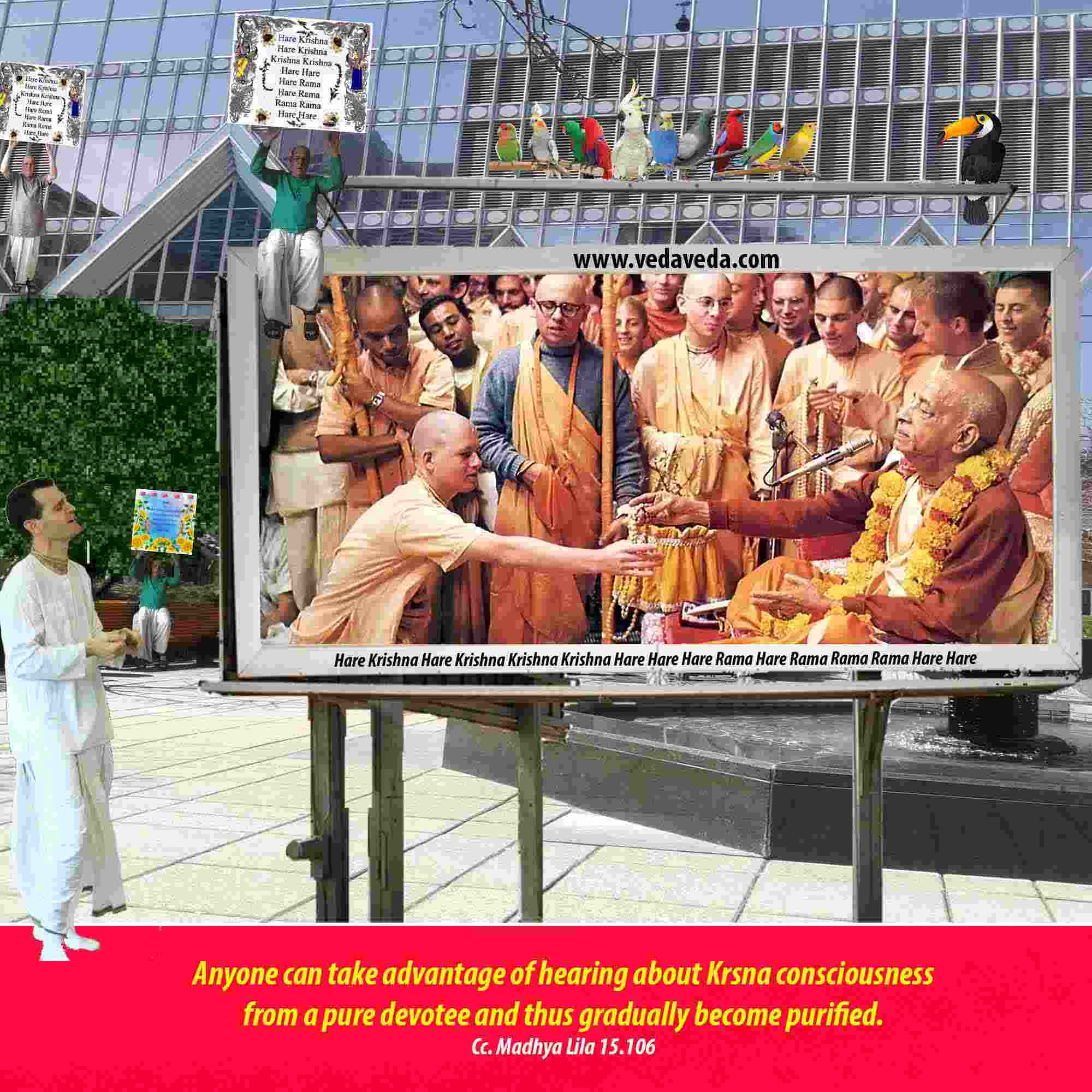
TRANSLATION
Śrī Caitanya Mahāprabhu replied, "Whoever chants the holy name of Kṛṣṇa just once is worshipable and is the topmost human being.
PURPORT
Śrīla Bhaktisiddhānta Sarasvatī Ṭhākura says that simply by chanting the holy name of Kṛṣṇa once, a person becomes perfect. Such a person is understood to be a Vaiṣṇava. With such faith and belief, one may begin a life of Kṛṣṇa consciousness, but an ordinary person cannot chant the holy name of Kṛṣṇa with such faith. This is confirmed by Śrīla Rūpa Gosvāmī in his Upadeśāmṛta: kṛṣṇeti yasya giri taṁ manasādriyeta. One should accept the holy name of Kṛṣṇa to be identical with the Supreme Personality of Godhead, Transcendence Himself. The holy name of Kṛṣṇa is also identical with Kṛṣṇa and is also cintāmaṇi. The name Kṛṣṇa is the personification of sound perfectly transcendental and eternally liberated from material contamination. One should understand that the name Kṛṣṇa and Kṛṣṇa are identical. Having such faith, one must continue to chant the holy name. When one is situated on the neophyte platform, one cannot understand the devotional ingredients of a pure, unalloyed devotee. However, when the novice engages in devotional service-especially in Deity worship-and follows the order of a bona fide spiritual master, he becomes a pure devotee. Anyone can take advantage of hearing about Kṛṣṇa consciousness from a pure devotee and thus gradually become purified.
A devotee who believes that the holy name of the Lord is identical with the Lord is a pure devotee, even though he may be in the neophyte stage. By his association, others may also become Vaiṣṇavas.
One is known as a materialistic devotee if he simply worships the Deity of Hari with faith but does not show proper respect to the devotees and to others. This is confirmed in Śrīmad-Bhāgavatam (11.2.47):
arcāyām eva haraye
pūjāṁ yaḥ śraddhayehate
na tad-bhakteṣu cānyeṣu
sa bhaktaḥ prākṛtaḥ smṛtaḥ
"Anyone who engages with faith in the worship of the Deity of Hari but does not show proper respect to the devotees and to others is known as a materialistic devotee." However, by associating with a neophyte devotee who believes that the holy name of the Lord is identical with the Lord, one can become a devotee also. When Lord Caitanya was teaching Sanātana Gosvāmī, He said:
śraddhāvān jana haya bhakti-adhikārī
'uttama', 'madhyama;', 'kaniṣṭha'--śraddhā-anusārī
yāhāra komala-śraddhā, se 'kaniṣṭha' jana
krame krame teṅho bhakta ha-ibe 'uttama'
rati-prema-tāratamye bhakta-taratama
"A person who has attained firm faith is a real candidate for advancing in Kṛṣṇa consciousness. According to the faith, there are first-class, second-class and neophyte devotees. One who has preliminary faith is called kaniṣṭha, or a neophyte. The neophyte, however, can become an advanced devotee if he strictly follows the regulative principles set down by the spiritual master. The pure devotee whose faith advances becomes a madhyama-adhikārī and uttama-adhikārī." (Cc. Madhya 22.64,69-70)
It is thus concluded that even a neophyte devotee is superior to the karmīs and jñānīs because he has full faith in chanting the holy name of the Lord. A karmī or a jñānī, regardless of his greatness, has no faith in Lord Viṣṇu, His holy name or His devotional service. One may be advanced religiously, but if he is not trained in devotional service, he has very little credit on the transcendental platform. Even a neophyte devotee engaged in Deity worship in accordance with the regulations set forth by the spiritual master is in a position superior to that of the fruitive worker and speculative philosopher.

